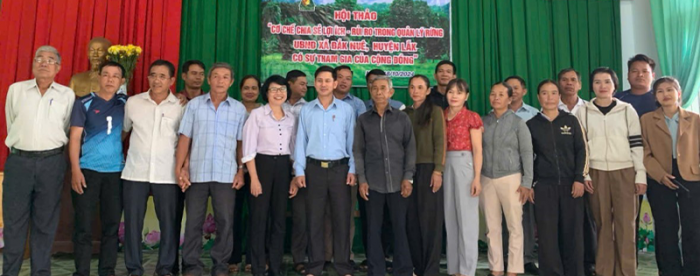News
Our stories ... ...

Viet Nam - 21 April, 2025
In Viet Nam’s Central Highlands, Tropenbos Viet Nam has been helping build trust between Indigenous Peoples and local communities (IPLCs) and local authorities to resolve forestland disputes and improve forest governance.
For centuries, Indigenous Peoples and local communities (IPLCs) in the Central Highlands of Viet Nam have depended on forests for livelihoods. However, migration—both state-led and free migrations—and forestland allocations after 1975 significantly changed demographic and governance dynamics in the region. Large parts of forestland were allocated by the state to local authorities, represented by Commune People Committees (CPCs). These changes in forestland allocation resulted in disruptions of traditional forestland use patterns. IPLCs, lacking sufficient forestland for cultivation, encroached on CPC-managed forests, creating forestland disputes between the two groups.
Over time, these disputes led to growing distrust. CPCs, focused on maintaining administrative control over forest areas, were reluctant to engage IPLCs, while IPLCs felt excluded from decisions affecting their ancestral lands. This impasse not only strained community relations but also hindered efforts toward sustainable forest governance. In response, Tropenbos Viet Nam (TBVN) facilitated a locally driven process to support forest co-management and restore trust between the IPLCs and CPCs.
Recognizing that sustainable solutions for co-existence require collaboration, TBVN initiated a participatory process that involved IPLCs, CPCs, and other stakeholders in the landscape. Workshops and trainings, facilitated by experts from the University of Central Highlands, provided a neutral space for dialogue. These sessions helped all stakeholders develop a shared understanding of forest governance principles, breaking down misconceptions and fostering cooperation.
A major milestone was the co-creation of a risk-benefit sharing mechanism. This framework outlined clear roles and responsibilities, ensuring that both IPLCs and CPCs could manage and use forest resources without rising tensions. The development of the risk-benefit sharing mechanism was slow, asking for careful trust-building efforts between the stakeholders. Based on a conflict sensitive approach and thorough stakeholder analysis, TBVN was able to navigate the relations in such a way that IPLCs and CPCs could agree on the developed mechanism.
The co-developed mechanism has laid the basis for sustainable forestland governance by fostering collaboration between IPLCs and CPCs. The multi-stakeholder dialogues, facilitated by Tropenbos Viet Nam, fostered shared decision-making in the landscape. By recognizing the rights and responsibilities of IPLCs while maintaining the CPCs' management structure, the mechanism provides a structured approach to reducing forestland disputes and promoting equitable access to forest resources.
In addition to conflict resolution, this process has strengthened local capacities for sustainable forest management. The trainings and workshops have provided practical knowledge on land-use planning, forest conservation and sustainable resource use. This focus on common interest between the conflicting parties has supported trust-building throughout the process.
The participatory process in Viet Nam’s Central Highlands demonstrates how integrating a conflict-sensitive approach into environmental governance can strengthen trust, improve stakeholder engagement, and lead to more equitable and sustainable forest management. It also shows how local solutions and cooperation can address long-standing disputes and build more inclusive forest management.
Moving forward, Tropenbos Viet Nam will continue advocating for the institutionalization of the risk-benefit sharing mechanism while expanding its lessons to other forested landscapes. Strengthening collaboration between IPLCs, CPCs, local authorities, and policymakers will be essential for long-term sustainability. By integrating a conflict sensitive lens in their forest management projects, Tropenbos Viet Nam will continue to work on sustainable solutions for trust and cohesion in the landscape.